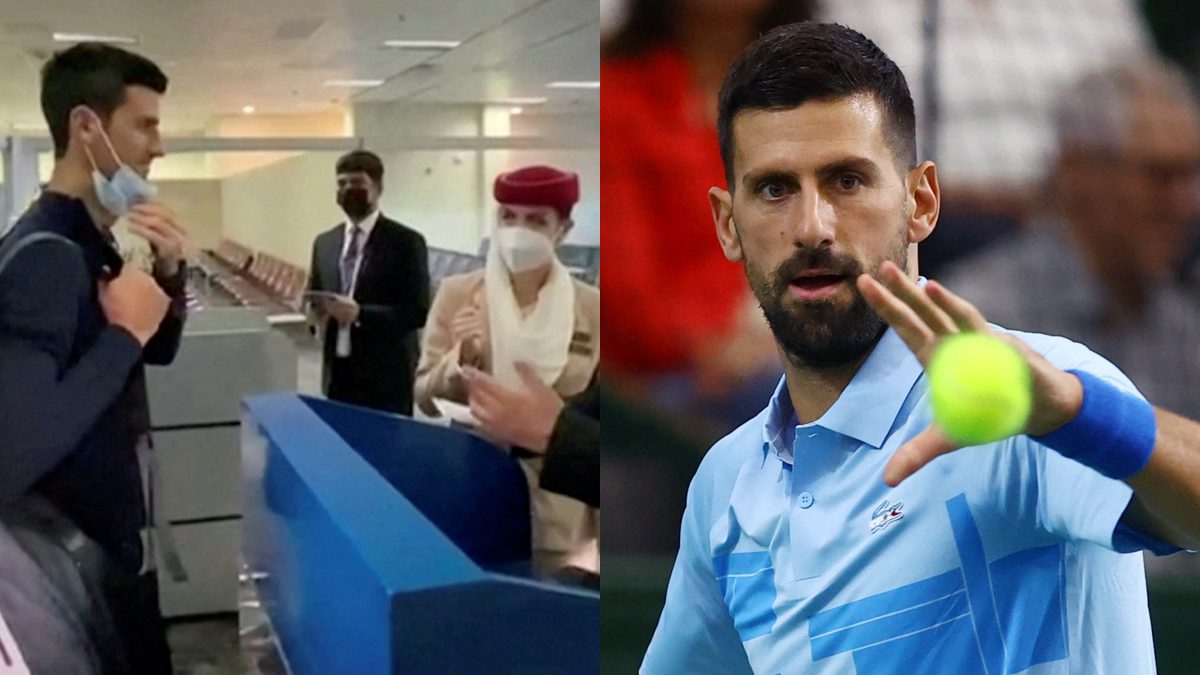Legendary tennis player Novak Djokovic has still not managed to get over the “trauma” he experienced in 2022 when he was deported from Australia for not taking the COVID-19 vaccine. Djokovic arrived in Australia in early January 2022, however, he was not allowed to defend his Australian Open crown by the national government as they cancelled his visa on “health and good order” grounds, and the tennis star was later deported after an unsuccessful appeal.
Rafael Nadal won the Australian Open in 2022 but Djokovic reclaimed the crown in 2023 before Jannik Sinner won the year’s first Grand Slam in 2024. Djokovic is now back in Melbourne, Australia, to win a record-extending 11the Australian Open title. Upon his return to the Australian city, the 37-year-old Serbian said that he is still fighting the fear of getting deported from Australia in his mind every time he travels to the country.
Djokovic still fighting deportation trauma
“The last couple of times I landed in Australia, to go through passport control and immigration - I had a bit of trauma from three years ago,” Djokovic told Melbourne’s Herald Sun.
“And some traces still stay there when I’m passing passport control, just checking out if someone from immigration zone is approaching.
“The person checking my passport - are they going to take me, detain me again or let me go? I must admit I have that feeling.”
The 24-time Grand Slam champion added that he doesn’t hold any grudges over what happened in 2022.
“I don’t hold a grudge. I came right away the year after and I won,” Djokovic shared. “My parents and whole team were there and it was actually one of the most emotional wins I’ve ever had, considering all that I’d been through the year before.”
It’s not just Djokovic, even for fans it was an extremely rare and traumatic period as the legendary tennis player was forced to stay at an immigration hotel for five days as he made an unsuccessful appeal and was eventually deported.
Initially, Djokovic had a temporary reprieve when a lower court blocked his immediate deportation but reports and photos showing Djokovic violating isolation protocols in his home country further undermined his case. He had failed to isolate after testing positive for COVID-19 in December 2021, the same positive result he cited to seek a medical exemption from Australia’s vaccination mandate for visitors.
In court documents, Djokovic defended his unvaccinated status as a matter of personal choice. However, then-Australian Immigration Minister Alex Hawke argued that Djokovic’s presence could pose a threat to public order by fueling anti-vaccination sentiment, especially as the country was facing its worst surge of COVID-19 cases.
How Djokovic was deported from Australia in 2022
Here is a timeline of how Djokovic was deported ahead of the Australian Open in 2022:
December 16: Djokovic tests positive for COVID-19. The diagnosis is disclosed in an affidavit submitted to the Australian federal court.
December 17: Djokovic attends a charity event in Belgrade without wearing a mask, as seen on social media. He later claims he was unaware of his positive test result at the time.
December 18: Djokovic violates Serbia’s isolation rules by giving an in-person interview and participating in a photo shoot for L’Equipe in Belgrade. He later defends this decision, stating he didn’t want to disappoint the journalist.
December 22: Djokovic’s PCR test result comes back negative.
December 30: Tennis Australia informs Djokovic that he has been granted a temporary medical exemption for entry into Australia. This exemption is confirmed to have been reviewed by medical experts.
January 1: Djokovic declares on his travel form that he did not travel anywhere in the 14 days prior to his departure. However, reports later reveal his travel between Serbia and Spain during that period. Djokovic admits the error.
January 5: Djokovic arrives in Australia, sparking a social media uproar after posting on Instagram: “I’m heading Down Under with an exemption.”
January 6: He is detained overnight by Australia’s Border Force at the airport and informed of the government’s intention to deport him.
January 7: Djokovic is allowed to isolate at a hotel for 72 hours.
January 10: In a virtual court hearing, the court rules in Djokovic’s favour, stating it would be unreasonable to deport him at that time. Immigration Minister Alexander Hawke announces his intent to use discretionary powers to cancel Djokovic’s visa.
January 14: Hawke cancels Djokovic’s visa, citing concerns that his presence could pose a risk to public health amid Australia’s record COVID-19 cases.
January 16: The Australian Federal Court upholds the visa cancellation. Djokovic’s appeal is rejected, confirming his deportation from the country.


)
)
)
)
)
)
)
)
)



